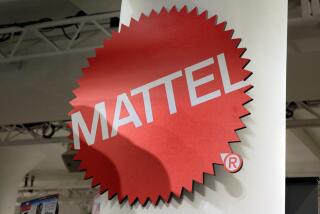Neutrogena Negotiating Possible Sale : Corporations: Personal care products firm, whose stock has struggled, describes suitor as ‘substantially larger company.’
- Share via
Neutrogena Corp., which turned a line of transparent soap bars into a multimillion-dollar skin and hair care products business, said Wednesday that it is negotiating a possible sale of the firm.
Los Angeles-based Neutrogena revealed the talks with what it described as a “substantially larger company” after its once-languishing stock rose as high as $23 in heavy Nasdaq trading Wednesday. The stock, which traded as low as $16 earlier this year, closed up 87.5 cents at $21.625.
Neutrogena said no agreement has been reached and that a deal is not certain.
There had been growing speculation in the health and beauty aids industry that Neutrogena, which is 45%-owned by Chairman Lloyd E. Cotsen and his family, was in serious buyout talks, said Lloyd Greif, president of Greif & Co., a Los Angeles-based investment banking firm. The potential buyers reportedly included Procter & Gamble, Maybelline and Chesebrough-Ponds.
Faced with slow sales, big consumer product companies have pursued growth by acquiring smaller but well-known cosmetics brand-name products and their makers. Last year, Canoga Park’s Redken Laboratories was sold to L’Oreal, and a German cosmetics firm acquired a majority stake in Woodland Hills-based Sebastian.
“There has been a whole lot of activity recently in the personal care products business,” said Greif, who also cited Procter & Gamble’s recent purchase of Giorgio perfumes and cosmetics from Avon Corp. “Neutrogena is a significant player out there . . . and it’s clear that the company is viewed as an attractive acquisition.”
Neutrogena is prized for its well-known and highly regarded line of specialty soaps and hair care products sold through drugstores, supermarkets and other larger retailers. By creating a high-quality image for its soaps, Neutrogena has been able to distinguish a commodity product and charge a higher price than competitors. It has what marketing consultant Robert Grayson calls “mass chic.”
“It appeals to (consumers) who would like extra status but don’t want to pay extra money for it in a department store,” he said.
*
Originally called Natone Products in the 1950s, the company made lip brushes and other cosmetic products before it began marketing a transparent, amber-colored soap created by a Belgian doctor. The soap was named Neutrogena.
Cotsen, who joined the company in 1957, helped differentiate the soap from competitors by convincing doctors and dermatologists to recommend it. With the addition of a Neutrogena hair care line in 1980, the company enjoyed several years of rapid growth and profitability.
Sales have continued to rise and reached $282 million for the fiscal year ended Oct. 31. Neutrogena’s profit, however, plunged in 1990 as competition increased. Profit has since bounced back, but Neutrogena stock, which traded as high as $53 a share in 1987, has continued to struggle.
In 1991, one of the company’s highly regarded executives, Allan Kurtzman, returned to Neutrogena as president and chief operating officer after helping turn around ailing cosmetics maker Max Factor. Max Factor was eventually sold to Procter & Gamble.
More to Read
Inside the business of entertainment
The Wide Shot brings you news, analysis and insights on everything from streaming wars to production — and what it all means for the future.
You may occasionally receive promotional content from the Los Angeles Times.










